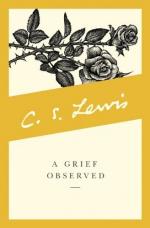
|
| Name: _________________________ | Period: ___________________ |
This test consists of 15 multiple choice questions and 5 short answer questions.
Multiple Choice Questions
1. According to the author, what kind of faith cannot survive a serious challenge such as death?
(a) An impossible faith.
(b) The faith of the saints.
(c) The only kind of faith that is possible.
(d) A house of cards.
2. How long did "low-hung grey skies" hang over the author?
(a) A month.
(b) A week.
(c) A year.
(d) 10 days.
3. What does the author think might have influenced his love for H.?
(a) Egoism.
(b) Reflection of the author's love of God.
(c) A desire to have children.
(d) Loneliness.
4. What is the only thing the author thinks matters about his anger toward God?
(a) That his anger could bring H. back.
(b) That the author's anger is justified.
(c) That the author release his anger.
(d) That God is a healer or a sadist.
5. What is all reality, according to the author?
(a) Iconoclastic.
(b) Truth.
(c) Illusion.
(d) A gift.
6. In the third chapter, what does the author decide is happening to his wife in the next life?
(a) She has become an angel.
(b) She is perfected in God's eyes.
(c) Absolutely nothing.
(d) God continues to "temper her."
7. What purpose do images of H. serve for the author?
(a) They bring Christ to mind.
(b) They remind the author of H.'s exact presence.
(c) They remind the author of God.
(d) They are links.
8. Why can the body suffer so much more than the mind, according to the author?
(a) Because God made it that way.
(b) The mind is capable of evasion.
(c) The mind never suffers.
(d) The body is stronger than the mind.
9. What does the author say can shatter the author's idea of God?
(a) Scripture.
(b) If the author changes his idea.
(c) Religious reflections.
(d) God Himself.
10. In Chapter Four, what did the author say he finally experienced about H.?
(a) Her mind.
(b) A reunion of lovers.
(c) Her soul.
(d) A sense of joy.
11. What does the author say is the Lord's "grand enterprise"?
(a) To give people the ability to question Him.
(b) To make death such a mystery.
(c) To test human faith.
(d) To make a spiritual animal.
12. What does the author think it means if human suffering is unnecessary?
(a) That Satan causes suffering.
(b) That humans bring on their own suffering.
(c) That human suffering is an illusion.
(d) Either there is no God or He is bad.
13. How must God be approached?
(a) As the means.
(b) As the road.
(c) As One who shares in human suffering.
(d) As the goal.
14. What does the author say is one of the miracles of love?
(a) The ability to explain.
(b) The power to see through enchantments.
(c) The gift of healing.
(d) The power of forgiveness.
15. What does the author say is the obvious danger of images?
(a) They do not look like their subjects.
(b) They make people crazy.
(c) They are not the real thing.
(d) They fade.
Short Answer Questions
1. About what is the author's remaining problem in Chapter Four?
2. What one thing has sufficient force to rattle one's faith, according to the author in Chapter Three?
3. What does the author say cannot compare with physical pain?
4. When was another time when the author enjoyed rambling walks?
5. What do Bridge-players tell the author makes the game serious?
|
This section contains 558 words (approx. 2 pages at 300 words per page) |

|




